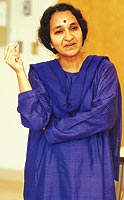 |
|
| Carl
Jacobson talks with a farmer in Yudaohe, Shansi Province. |
 |
Those
of us involved with the Shansi Memorial Association frequently
receive questions from alumni or students who are mystified about
what we do and where. Since President Nancy S. Dye's sabbatical
visit to the Shansi program sites last fall, we have had more
queries than usual. Some of the questions most frequently asked
are these:
EXACTLY
WHAT IS THE SHANSI ASSOCIATION?
Many
alumni are aware that there is a Shansi office somewhere on campus,
know that it that has something to do with Asia, and that it has
been around for a long time. The correct answer: Shansi
today
is a vibrant fabric of lives and experiences of people from both
sides of the Pacific.
The
Shansi Association sends young Oberlin alumni to Indonesia, India,
Japan, and China, where they realize that the way of life they
know as "normal" is not always thus. Shansi fellowships provide
an opportunity for graduates to stay in their assigned country
for up to two years. Obies learn the languages of their host countries,
teach English to undergraduate students and faculty, volunteer
with children in orphanages, work in HIV programs for prostitutes,
and teach math to impoverished children.
With grants underwritten by Shansi, Oberlin faculty members and
staff travel to Asia to lecture on botany, European history, and
constitutional law. Shansi-sponsored winter term projects for
students and faculty include the study of rainforest ecology in
South China, the status of women in India, and volcanoes in Indonesia.
Asian scholars have come to Oberlin under Shansi's wing to complete
work on a PhD examining American women authors, to conduct research
in organic chemistry, and to teach a class on postcolonial literary
criticism. Visiting professors arrive here to teach and share
insights about what's going on in their countries culturally and
politically.
IS
IT A RECIPROCAL PROGRAM?
Yes,
the cultural learning goes both ways. Shansi fellows report that
they experience dramatic personal growth, and many have been prompted
to go on to study law, medicine, public health, social work, community
activism, and the environment, and to careers in international-exchange
administration. Visiting scholars from Asia return to their own
institutions invigorated by new insights and often take on leadership
roles in educational innovation.
WHERE
DOES SHANSI HAVE A PRESENCE?
| |
 |
 |
Visiting
Professor Rajeswari Sundar Rajan, teaching about the "new"
Indian woman. |
In
China the program is at Yunnan University in the southwest and
at Shanxi Agricultural University near Beijing. With 8,000 students,
Yunnan offers
graduate programs and PhD tracks and has been named one of the
top 100 universities in
China by the Ministry of Education. There are four Shansi fellows
teaching there this year. Shanxi Agricultural University is on
the site of the Ming Hsien schools founded in Taigu in Shanxi
Province by Oberlin alumni, and is the only agricultural school
in China actually located in the countryside. Three Shansi fellows
taught there this past year.
The American College has been awarded five stars by the National
Assessment and Accreditation Council and since January 1988 has
been recognized as a study center for the Indira Ghandi National
Open University. In 1990 the college began a teaching program in
applied science called Jivana Jyoyhi,
with a diploma course in computer skills for physically disabled
students. One of the two lecturers in spoken English last year was
Tom Pruiksma, whose recollections about his experience there appear
below.
Shansi's exchange program with Gadjah Mada University in Java,
Indonesia, has operated continuously since 1972. Throughout the
political and economic crisis there, Shansi has monitored the
situation while keeping four Shansi fellows on site to teach English
to younger faculty members hoping to go abroad to earn higher
degrees. They work, too, in the language program within the Faculty
of Arts, Sastra, teaching English and other courses. One of the
fellows there last year taught English to the Sultan of Yogyakarta,
Hamengkubuwono X.
And, in Japan, Shansi is affiliated with Obirin University in
Machida, on the outskirts of Tokyo, with three Shansi fellows
in the English language program. *
Shansi
is an independent charitable foundation now in its 94th year.
It is one of the oldest educational exchange institutions in the
United States, with every intention of continuing the Asian collaboration
as long as there is an Oberlin College.

